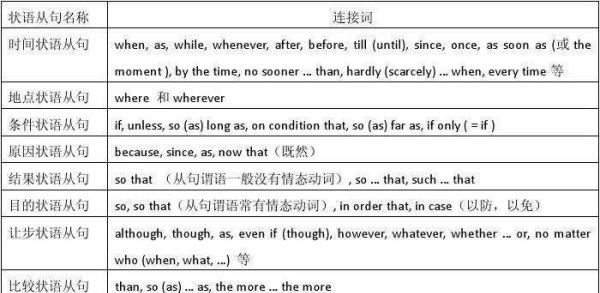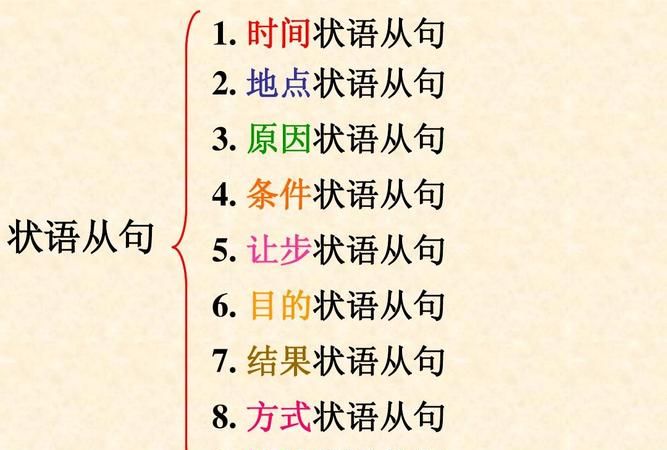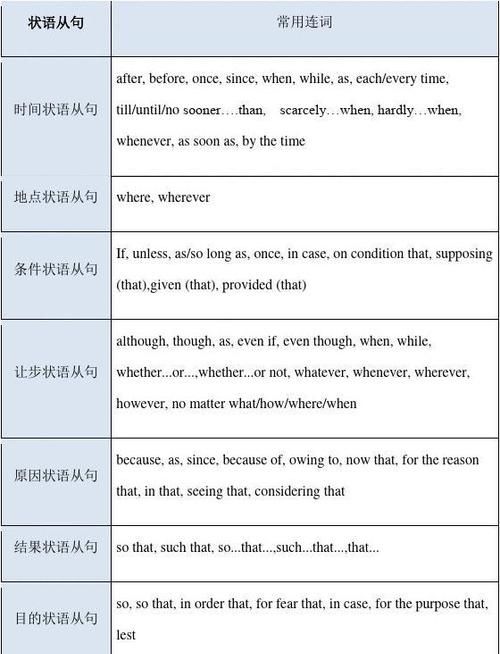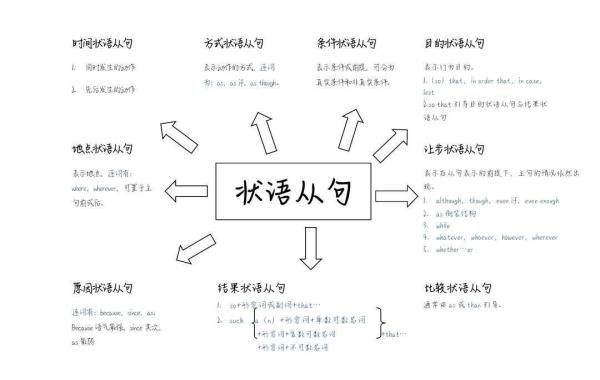本文目录
九大状语从句 请举例 并说明每句修饰的是什么词
一、时间状语从句
用表示时间的连词连接一个句子作状语,这样的主从复合句就是时间状语从句。连接时间状语从句的连接词有:when, before, after, while, as soon as, until, since...... 这里要注意一点的是,如果主句是一般将来时,从句只能用一般现在时表示将来意义。
二、地点状语从句
地点状语从句表示地点、 方位, 这类从句通常由where、wherever等引导。地点状语从句可置于句首、句中或句尾。
三、原因状语从句
原因状语从句指在句中用来说明主句原因的从句。引导原因状语从句的从属连词有because(因为), as(由于), since(既然), now(that)(既然), when(既然), seeing (that) (由于,鉴于)。
四、条件状语从句
由引导词if或unless引导的状语从句叫做条件状语从句。在英文中,条件是指某一件事情实现之后(状语从句中的动作),其它事情(主句中的动作)才能发生,通常译作“假如”。
五、目的状语从句
目的状语从句:从句部分是用以补充说明主句中谓语动词发生的目的的状语从句。
表示目的状语的从句可以由that, so that, in order that, lest, for fear that, in case等词引导;目的状语从句的谓语常含有may, might, can, could, should, will, would等情态动词。
六、让步状语从句
让步状语从句,是指状语从句中的一种,其本身也是状语从句。一般翻译为“尽管……”或“即使……”,就是我们日常生活中用的“退一步说…”的感觉。
七、比较状语从句
状语从句指句子用作状语时,起副词作用的句子。比较状语从句是其中的一种,主要运用于形容词和副词的原级、比较级及最高级的句子之中。
八、方式状语从句
1、由as, (just) as…so…引导的方式状语从句通常位于主句后,但在(just) as…so…结构中位于句首,这时as从句带有比喻的含义,意思是"正如…","就像",多用于正式文体。
2、由as if 和as though 引导的从句中的时态取决于说话者对所谈内容的态度。若说话者认为其看法是真的或可能会成为事实,从句谓语就按常规变化。
九、结果状语从句
结果状语从句其规律由so与such的不同词性决定。such 是形容词,修饰名词或名词词组,so 是副词,只能修饰形容词或副词。 so 还可与表示数量的形容词many, few, much, little连用,形成固定搭配。
结果状语从句的从句部分是补充说明主句中谓语动词发生的结果的,通常位于主句之后。结果从句中通常不用情态助动词,但must,can,could除外。such用在(形容词)名词之前;而so要用在形容词/副词之前,so或that有时会省略掉。

扩展资料:
1,时间状语从句
When I came into the room,he was writing a letter.
当我进屋时,他正在写信。
2、地点状语从句
Where there is a will,there is a way.
有志者,事竟成。
3、原因状语从句
I came back late yesterday because I was on duty.
昨天我回来晚了,是因为我要值班。
4、目的状语从句
We'll tell you the truth so that you can judge for yourself.
我吧真实情况告诉你,使你自己能做出判断。
5、结果状语从句
It is such an interesting novel that all of us want to read it.
这本书很有趣,大家都想看。
6、条件状语从句
We shall go there tomorrow if it doesn't rain.
如果明天不下雨,我们就去哪儿。
7、方式状语从句
Do as you are told.
按照人家告诉你做的去做。
8、让步状语从句
I'll go even though it rains tomorrow.
即使明天下雨,我也要去。
9、比较状语从句
He bought fewer books than I (did).
她买的书比我买得少。
参考资料:百度百科-状语从句
九大状语从句 请举例 并说明每句修饰的是什么词
状语从句是起着副词的作用的组词,用来修饰动词,副词和形容词。
状语从句可分为:
1.时间状语从句
(adverbial
clause
of
time)
例句:her
goldfish
died
when
she
was
young.(时间状语从句:when
she
was
young)
2.地点状语从句;(adverbial
clause
of
place)
例句:he
said
he
was
happy
where
he
was.
(地点状语从句:where
he
was)
3.原因状语从句;(adverbial
clause
of
reason)
例句:i
couldn't
feel
anger
against
him
because
i
liked
him
too
much.
(原因状语从句:because
i
liked
him
too
much)
4.条件状语从句;(adverbial
clause
of
condition)
例句:if
they
lose
weight
during
an
illness,
they
soon
regain
it
afterwards.
(条件状语从句:if
they
lose
weight
during
an
illness)
5.目的状语从句;(adverbial
clause
of
purpose)
例句:they
had
to
take
some
of
his
land
so
that
they
could
extend
the
chuchyard.
(目的状语从句:so
that
they
could
extend
the
chuchyard)
6.让步状语从句;(adverbial
clause
of
concession)
例句:i
used
to
read
a
lot
although
i
don't
get
much
time
for
books
now.
(让步状语从句:although
i
don't
get
much
time
for
books
now)
7.比较状语从句;(adverbial
clause
of
comparison)
例句:she
is
a
better
cook
than
i.
(比较状语从句:than
i)
8.结果状语从句;(adverbial
clause
of
results)
例句:my
suitcase
had
become
so
damaged
that
the
lid
would
not
stay
closed.
(结果状语从句:that
the
lid
would
not
stay
closed)
9.方式状语从句;(adverbial
clause
of
manner)
例句:
i
was
never
allowed
to
do
things
as
i
wanted
to
do
them.
(方式状语从句:
as
i
wanted
to
do
them)

状语从句的9种形式口诀
状语从句讲解
状语修饰动词、形容词、副词或整个句子.通常由副词、介词短语、动词不定式、分词和从句等担当.例如:
1.Naturally ,our grandparents were pleased to get our phone call .(副词)
2.We worked hard ,from sunrise to sunset .(介词状短语)
3.To help my disabled aunt ,I spend an hour working in her house every day .(不定式)
4.Seen from a distance ,the farmhouse looked deserted .(过去分词)
5.I know how to light a camp fire because I had done it before .(原因状语从句)
状语的位置比较灵活,可以位于句首、句末或句中.enough用作状语修饰形容词和副词时必须后置.
状语从句主要用来修饰主句或主句的谓语.一般可分为九大类,分别表示时间、地点、原因、目的、结果、条件、让步、比较和方式.尽管种类较多,但由于状语从句与汉语结构和用法相似,所以理解和掌握它并不难.状语从句的关键是要掌握引导不同状语从句的常用连接词
和特殊的连接词即考点.现分别列举如下:
1. 时间状语从句
常用引导词:when,as,while,as soon as,while,before,after,since ,till,until
特殊引导词:the minute,the moment,the second,every time,the day,the instant,immediately ,directly,no sooner … than,hardly …when,scarcely … when
I didn’t realize how special my mother was until I became an adult.
While John was watching TV,his wife was cooking.
The children ran away from the orchard(果园) the moment they saw the guard.
No sooner had I arrived home than it began to rain.
Every time I listen to your advice,I get into trouble.
2. 地点状语从句
常用引导词:where
特殊引导词:wherever,anywhere,everywhere
Generally,air will be heavily polluted where there are factories.
Wherever you go,you should work hard.
3. 原因状语从句
常用引导词:because,since,as,since
特殊引导词:seeing that,now that,in that,considering that,given that,considering that,
My friends dislike me because I’m handsome and successful.
Now that everybody has come,let’s begin our conference.
The higher income tax is harmful in that it may discourage people from trying to earn more.
Considering that he is no more than 12 years old,his height of 1.80 m is quite remarkable.
4. 目的状语从句
常用引导词:so that,in order that
特殊引导词:lest,in case,for fear that,in the hope that,for the purpose that,to the end that
The boss asked the secretary to hurry up with the letters so that he could sign them.
The teacher raised his voice on purpose that the students in the back could hear more clearly.
5. 结果状语从句
常用引导词:so … that,so… that,such … that,
特殊引导词:such that,to the degree that,to the extent that,to such a degree that,
He got up so early that he caught the first bus.
It’s such a good chance that we must not miss it.
To such an degree was he excited that he couldn’t sleep last night.
6. 条件状语从句
常用引导词:if,unless,
特殊引导词:as/so long as,only if,providing/provided that,suppose that,in case that,on condition that
We’ll start our project if the president agrees.
You will certainly succeed so long as you keep on trying.
Provided that there is no opposition,we shall hold the meeting here.
7. 让步状语从句
常用引导词:though,although,even if,even though
特殊引导词:as(用在让步状语从句中必须要倒装),while ( 一般用在句首 ),no matter …,in spite of the fact that,while,whatever,whoever,wherever,whenever,however,whichever
Much as I respect him,I can’t agree to his proposal.
尽管我很尊敬他,我却不同意他的建议.
The old man always enjoys swimming even though the weather is rough.
No matter how hard he tried,she could not change her mind.
He won’t listen whatever you may say.
8. 比较状语从句
常用引导词:as(同级比较),than(不同程度的比较)
特殊引导词:the more … the more … ; just as …,so…; A is to B what /as X is to Y; no … more than; not A so much as B
She is as bad-tempered as her mother.
The house is three times as big as ours.
The more you exercise,the healthier you will be.
Food is to men what oil is to machine.食物之于人,犹如油之于机器.
9. 方式状语从句
常用引导词:as,as if,how
特殊引导词:the way
When in Rome,do as the Roman do.
She behaved as if she were the boss.
Sometimes we teach our children the way our parents have taught us.

when时间状语从句时态口诀
状语从句三要点,时间,原因和条件;
从句如果表时间,after,before,when常用;
状语从句表原因,because一马来当先;
状语从句表条件,if
前面来引导;
主句通常前面走,从句紧紧跟在后。
从句如在主句前,从句之后加逗点。

以上就是关于九大状语从句顺口溜 ,九大状语从句 请举例 并说明每句修饰的是什么词的全部内容,以及九大状语从句顺口溜 的相关内容,希望能够帮到您。
